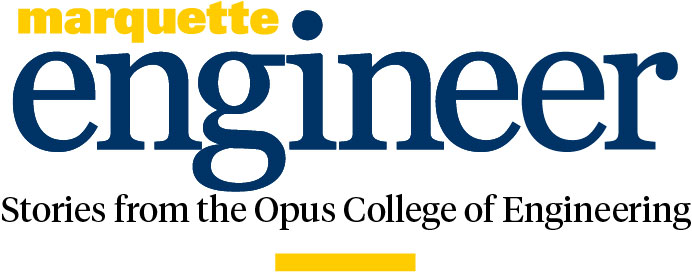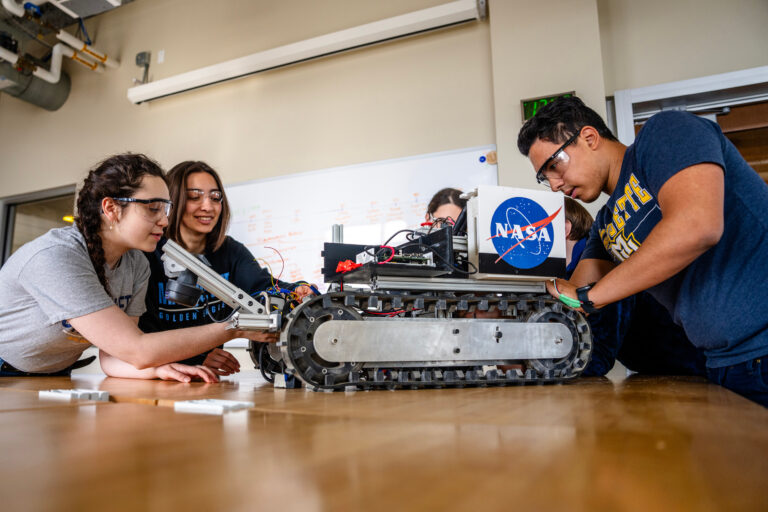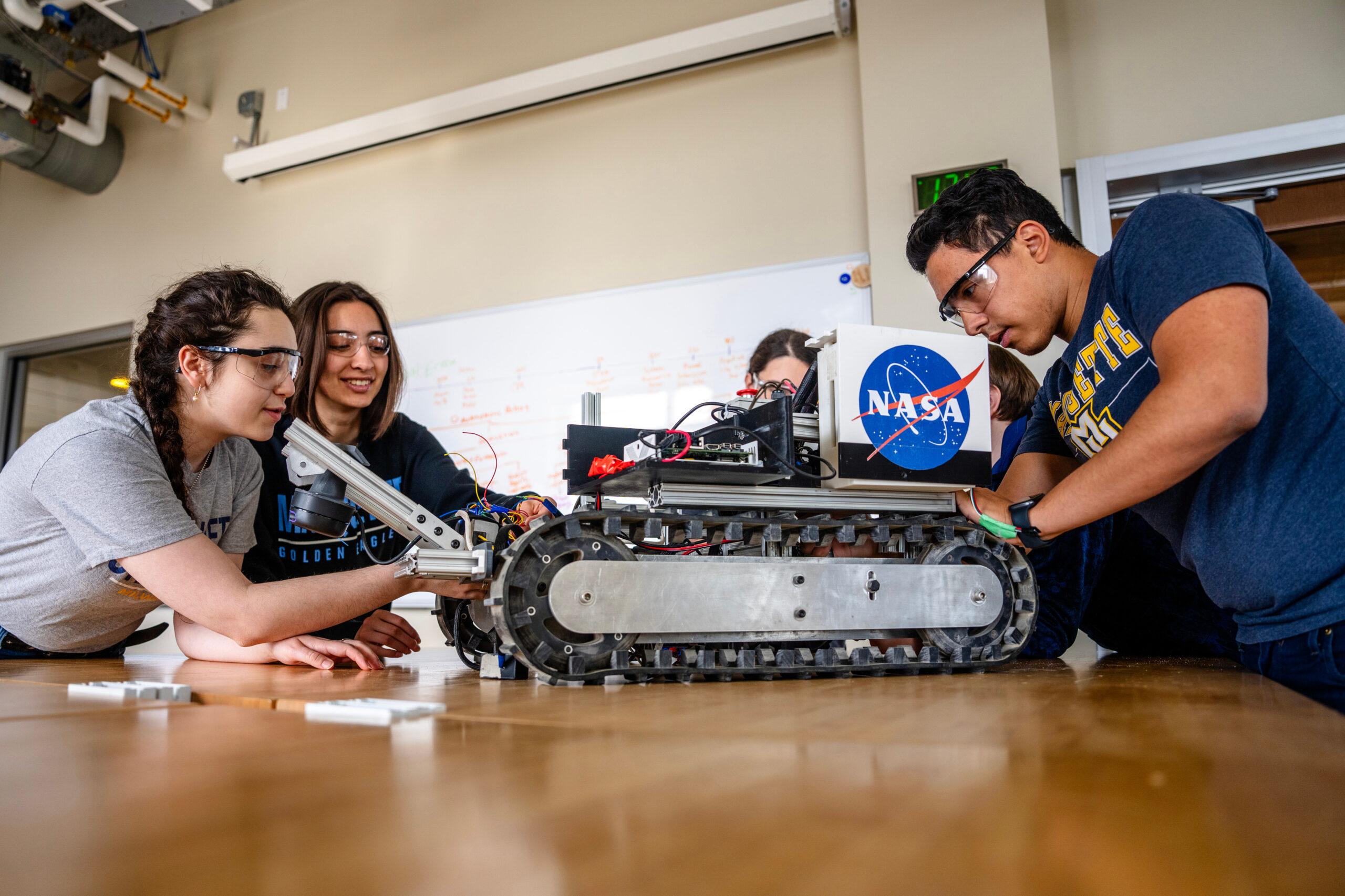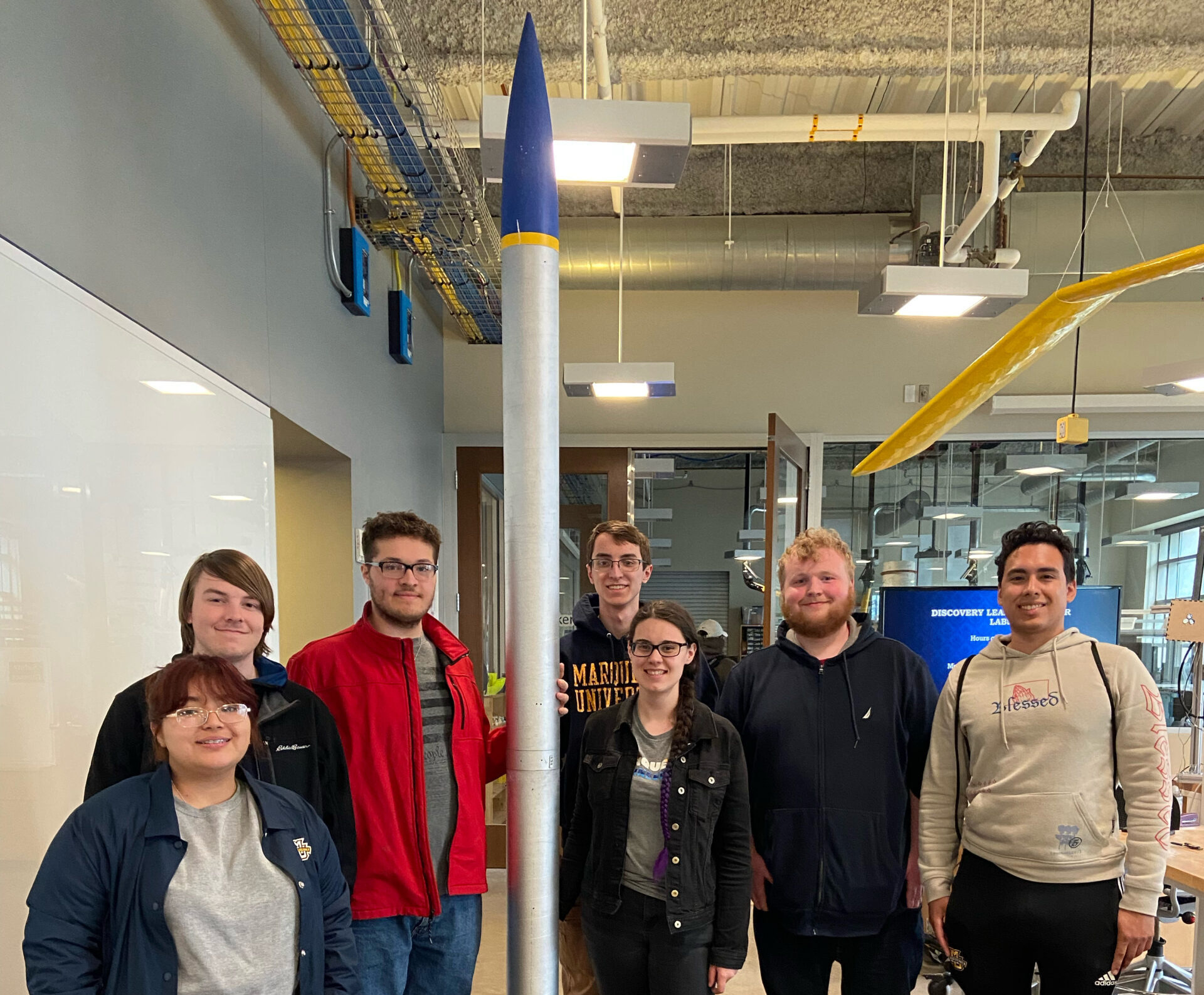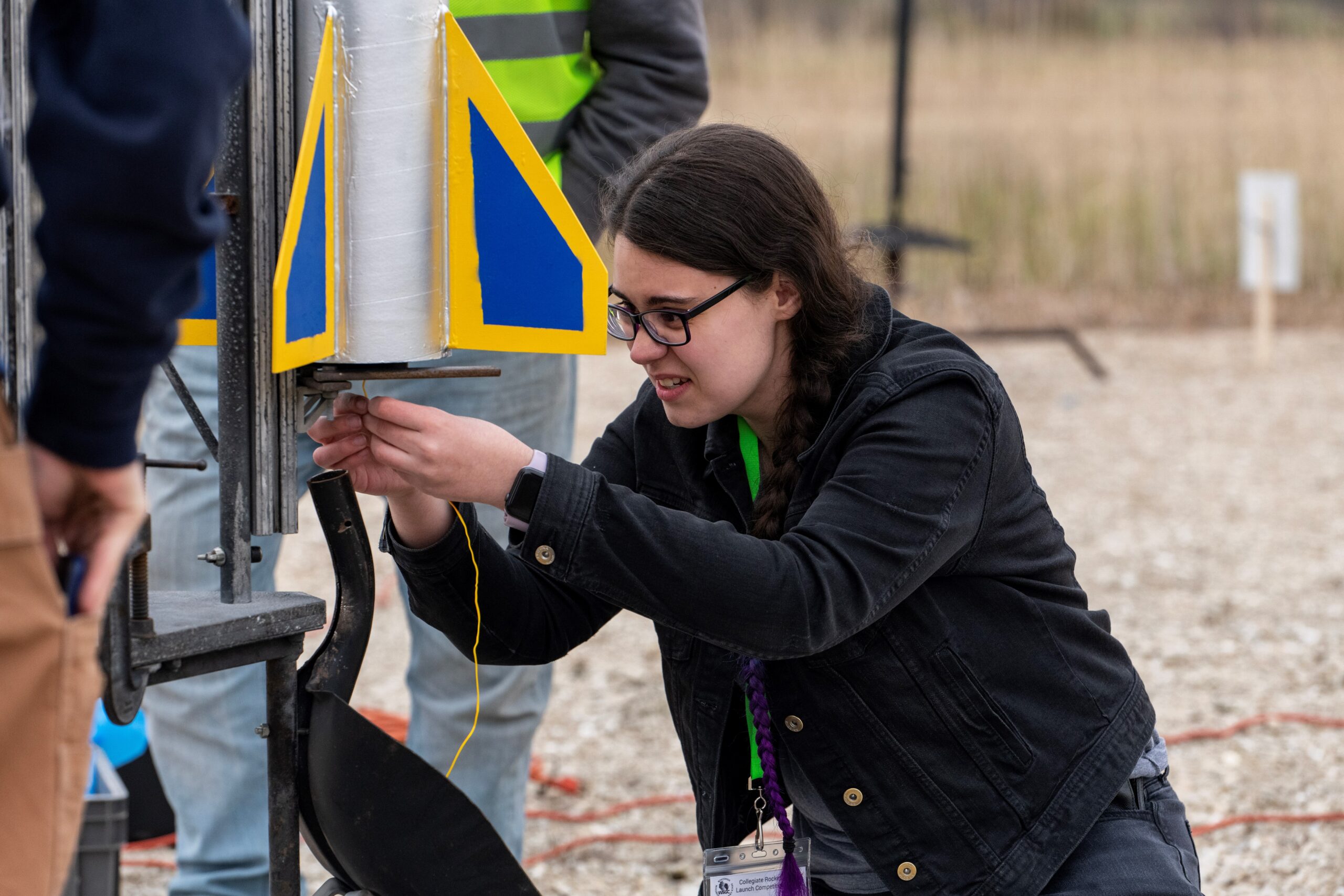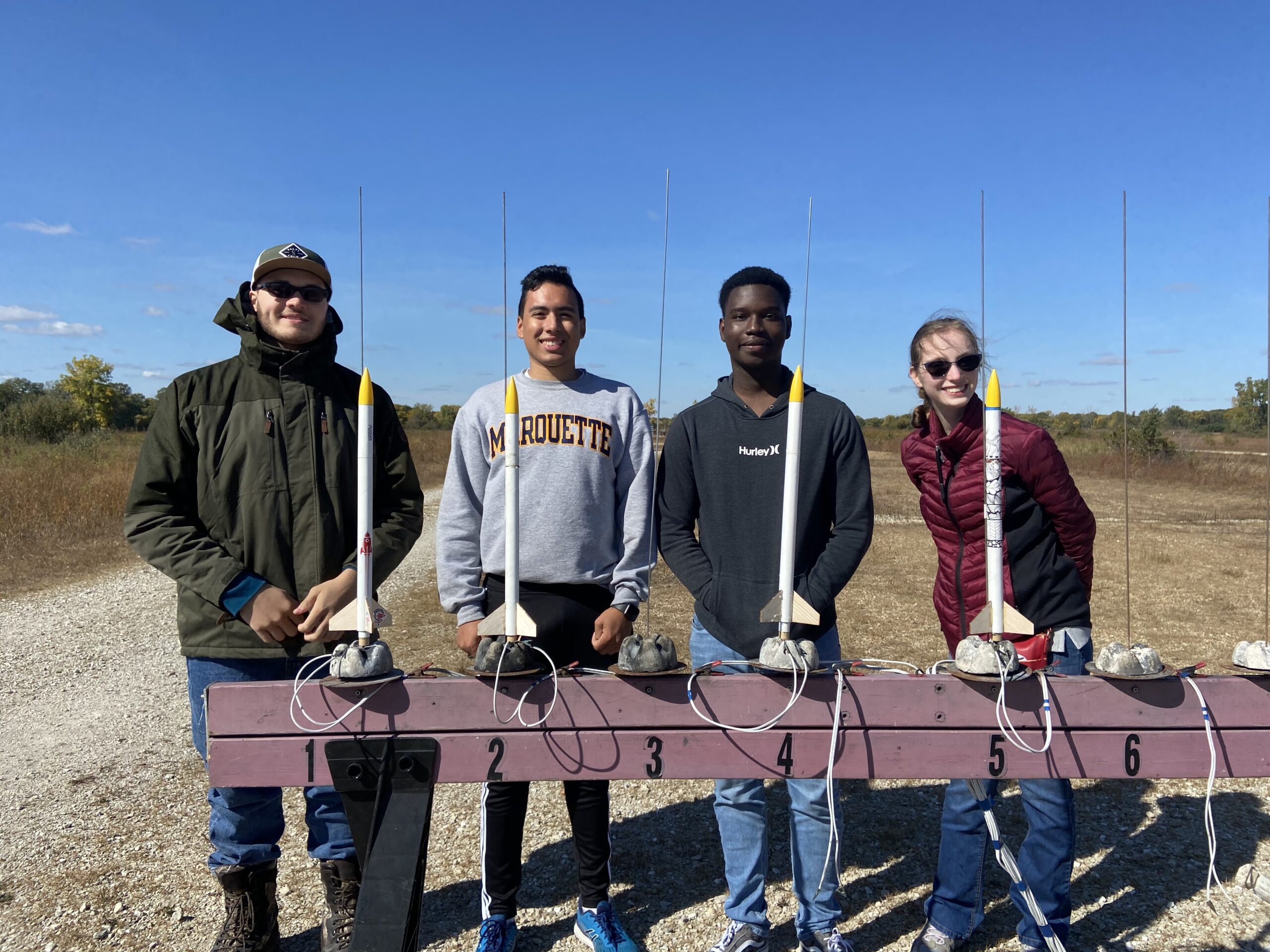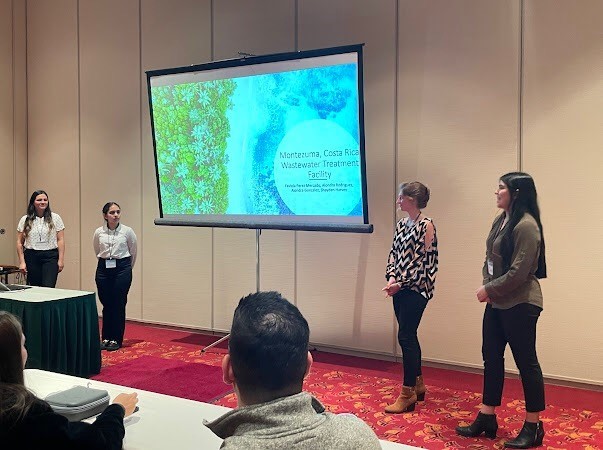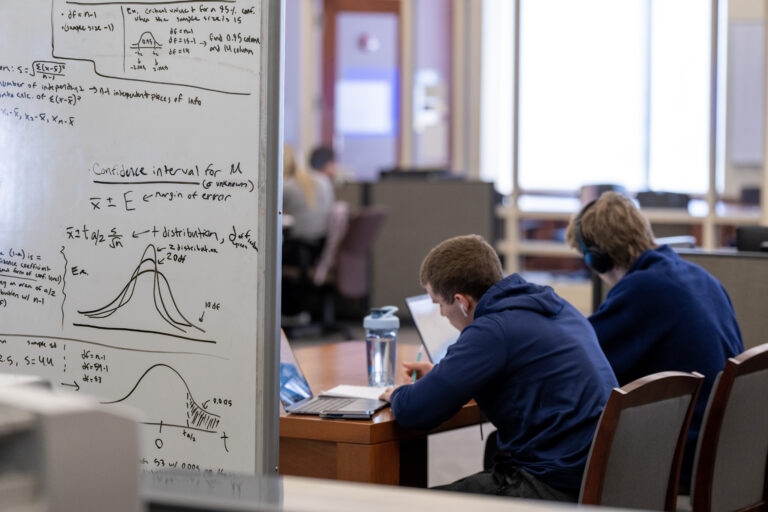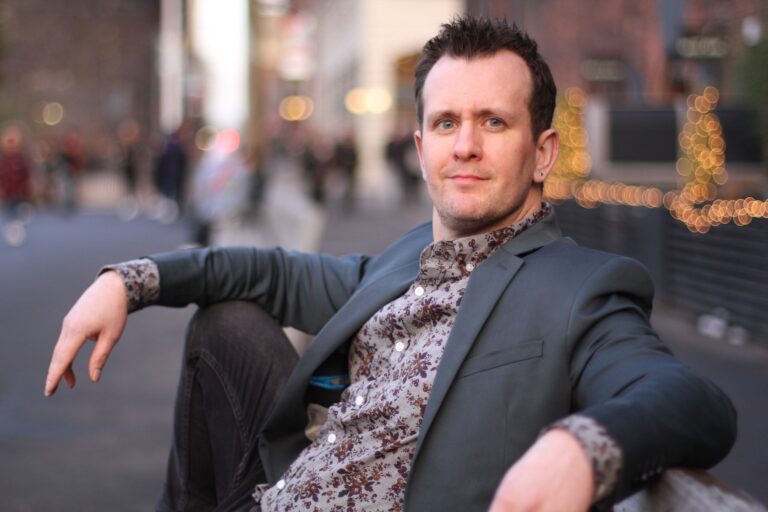In club-based teams and senior design projects, Marquette engineering students compete successfully against the biggest and the best, and deliver award-winning solutions to meet international needs.
For most of the school year, Nicole Schilder and her teammates had been building the rocket, piece by piece, wire by wire, week after week. Now, at the Wisconsin Space Grant Consortium’s 2023 Collegiate competition, it was time to launch.
They’d awakened early that spring morning and followed team tradition with a breakfast stop at Kwik Trip en route to the launch site in Kansasville, Wisconsin. They spent frantic minutes just after dawn readying the 10-foot metallic tube for launch in this patch of southeastern Wisconsin wilderness.
The judges were the ones who’d hit “Send.”
“When the button is actually pressed,” says Schilder, who was team lead, “you’re powerless. You’re done. You’re just standing there with your teammates, and just praying everything goes to plan.” Also present: Dr. John Moore, assistant professor of mechanical engineering and the club’s faculty adviser.
For the Marquette Rocketry club, this amounted to a pass/fail exam. They hadn’t benefitted from a trial run. The rocket they’d built had to meet two criteria: ascend to a height of 2,400 to 3,000 feet, and include payload that would eject from the rocket at its peak, fall gently to Earth thanks to a yellow parachute, and take a picture of its surroundings upon landing. The team chose a clear plastic hamster ball as payload.
“The judges seemed to like that,” Schilder says of the pet shop ingenuity.
Boom! Off their rocket went, trailing flames as it shot straight into the sky, disappearing from sight. An onboard altimeter told them its peak height: 2,583 feet, just shy of the world’s tallest building in Dubai and well within the altitude goal. Eventually, the GPS trackers told them where their rocket had landed, safely.
“We’ve always had success within our student organizations — the fact is that now, almost all of them are having success all at the same time.”
Dr. Mark Federle, professor of civil, construction and environmental engineering and associate dean for academic affairs
Throughout the day, other college teams from throughout Wisconsin took to the launchpad. In the end, one team rose above the others for the title: Marquette Rocketry. In only its third year as a freestanding club, it won Mission Grand Champion.
The club’s success added to a growing list of Marquette Engineering success stories across disciplines in recent years. More often than not, Opus College of Engineering teams have similarly reached remarkable heights and stuck the landing. For example, Marquette’s chapter of the American Society of Civil Engineers advanced to Nationals in 2022 in the Steel Bridge competition and in 2023 celebrated its 100th year as a chapter. Faculty- or alumni-advised student clubs, such as Rocketry or Engineers Without Borders, have also seen breakthrough success.
In other cases, it’s a capstone or senior design project such as the NASA’s Lunabotics robotic mining competition where Marquette placed among a handful of the top-ranked engineering programs in the country in 2023. The groups share a passion for collaboration and problem-solving related to building something to fulfill a task, be it a rocket, a lunar robot or an electrical system that literally lights rooms and brightens lives in a village far away from Milwaukee.
“We’ve always had success within our student organizations,” says Dr. Mark Federle, professor of civil, construction and environmental engineering and associate dean for academic affairs. “The fact is that now almost all of them are having success all at the same time.”
A winning, hands-on approach
Federle, who advises two award-winning groups — Engineers Without Borders and the Central States Water Environment Association senior design team — said momentum started building during COVID-19, as Marquette prioritized returning to the classroom and collaborating from socially safe distances. Other timeless factors have kept the momentum going: strong administrative support that allows groups to form easily and earn money for equipment and travel, plus a schoolwide approach that encourages students to apply classroom learning to real-world projects.
“These competitions tend to be more practice-oriented than they are theoretically oriented,” he says. “The nature of our hands-on engineering approach leads us to have a propensity for success.”
The five-member CSWEA team won an 11-team competition to propose wastewater treatment solutions for Bijagua, Costa Rica, earning top honors in the Global Water Stewardship category and sharing the win with Universidad de Costa Rica in the overall Global Water Stewardship category. The victories followed on a Marquette win from the previous year in the same competition.
Marquette’s Engineers Without Borders chapter won the Engineering Education Award from the National Council of Examiners for Engineering and Surveying in 2023. The recognition came for the sustainable water distribution project the group helped design and build in El Tesoro, Guatemala. It earned the chapter a $25,000 award.
“It’s learning to trust each other and knowing how to listen to each other.”
Daniel Whalen, Eng ’23, alum of Marquette Aerospace and Robotic Systems senior design team
The satisfaction of working on projects that dramatically improve people’s lives — supplying clean drinking water, designing a system to effectively clear wastewater — drew Claire Connelly, a 2023 engineering graduate, to both projects. Her experience as a project lead for the El Tesoro team, which took her on trips to the region to work on the project, particularly resonated.
“EWB, especially at Marquette, aligns itself as an organization that is truly in service of others’ dreams,” she says. “Marquette, as a Jesuit university, attracts a lot of students looking to make a difference in their communities and abroad. Participating in EWB was such a blessing because of how hardworking and excited all the students were to come together and do something positive with our education.”
Daniel Whalen, a 2023 engineering graduate who’s now working on his master’s in mechanical engineering at Marquette, echoed her appreciation for the teamwork involved.
“When you get a group of smart people in a room together, good things will happen,” he says. “It’s learning to trust each other and knowing how to listen to each other.”
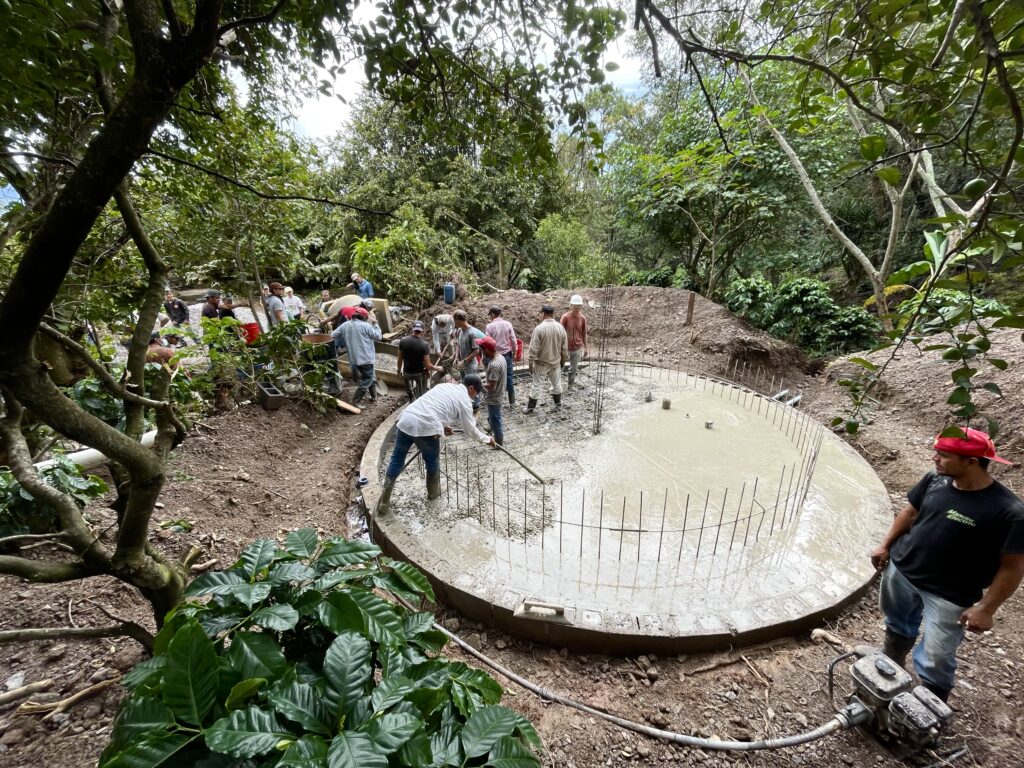
Whalen led a MARS (Marquette Aerospace and Robotic Systems) senior design team that in 2023 placed fifth out of 49 collegiate teams in NASA’s Lunabotics robotic mining competition.
This annual competition challenges student teams to design, build and demonstrate a lunar mining robot capable of extracting icy regolith material from the moon’s surface.
In addition to high scores for their work and presentations, the team also received the Innovation Award from NASA, which recognized the team’s exceptional ability to innovate and push boundaries.
Impressively, they were up against behemoths. The University of Iowa won, while the University of Alabama, which has a strong partnership with NASA due to the school’s proximity, was close behind.
Whalen credited MARS’ faculty adviser, Dr. Phil Voglewede, professor of mechanical engineering, for encouraging the students, who come from various disciplines within engineering, while respecting their autonomy.
“He does such a good job of asking the right questions to push us to come to the right conclusions,” Whalen says. “He knows so much about robotics and could tell us that’s not going to work, do this instead. But he wouldn’t do that. He lets us fail and lets us succeed on our own.”
Freedom to fail, room to succeed
And fail they did, at least to start. Just a week or so before the deadline, the robot they’d so carefully built started to shake during a test run.
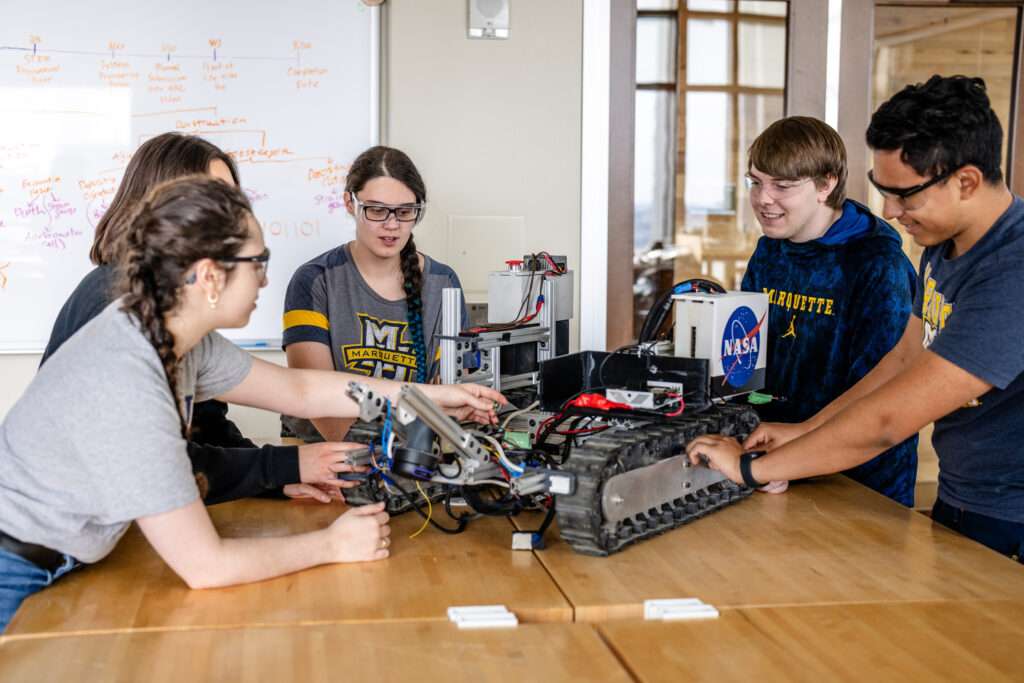
“And we’re like, ‘Shoot, click Stop,’” he says. “And then before we were able to stop it, the thing just … there was a big bang and it fell apart into a bunch of pieces. It was awful.”
Whalen and teammates worked nonstop overnight to put the robot back together again, finishing just before his 9 a.m. class the next day. A week or so later, the team made its deadline, filming the reconstructed robot in action in an empty room in Engineering Hall, showcasing the autonomous features they’d designed that helped earned them the Innovation award. They sent the video to NASA officials.
Results didn’t come until summer: fifth overall, first in innovation.
“It was so cool,” says Whalen, who was crunching Excel data for his summer engineer job at ATI Systems in Milwaukee during the online announcement. “I just wish I could have been with my teammates when we heard.”
Their success, and the satisfaction of a team’s shared dream being realized, has been happening more regularly of late. And it’s more than a coincidence.
“The cool part about Marquette, from my perspective, is we do get great students who come because of the education that we offer and the Jesuit values,” Federle says. “And so, you take leaders from high school and you give them an environment that they can thrive in — and they absolutely thrive.”
